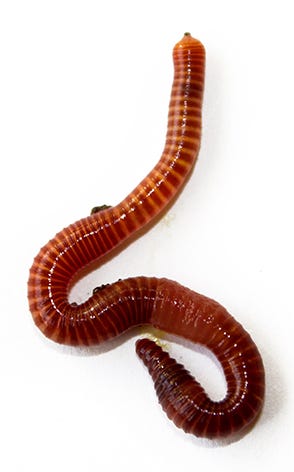Red wigglers: Boost your garden naturally
Red wigglers: Boost your garden naturally
Blog Article
Red Wigglers: The Secret to Eco-Friendly Composting
Red wigglers, clinically understood as Eisenia fetida, play a critical function in sustainable composting practices, offering an all-natural option to throw away monitoring. red wigglers. These worms not only take in organic materials however also transform them into important vermicompost, enhancing soil health and promoting eco-friendly equilibrium.
What Are Red Wigglers?
Although lots of people know with earthworms, red wigglers (Eisenia fetida) are a particular types that play a vital role in composting. Native to Europe, they have adapted well to a selection of atmospheres, specifically in decaying natural matter. Unlike common yard worms, red wigglers prosper in rich, wet environments, making them suitable for composting systems.
(eisenia fetida for sale)These worms are defined by their reddish-brown pigmentation and elongated bodies, normally determining between 3 to 4 inches in length. Red wigglers are epigeic worms, implying they live near the dirt surface area and feed upon rotting natural product. Their high reproductive price permits populations to proliferate under optimal problems, with the capability to double in number every few months.
Red wigglers have an one-of-a-kind gastrointestinal system that enables them to break down natural waste effectively. Their sustainable nature makes red wigglers a useful possession in eco-friendly composting techniques.
Benefits of Making Use Of Red Wigglers
Using red wigglers in composting systems offers various benefits that boost both the effectiveness of waste disintegration and the high quality of the resulting garden compost. These earthworms, medically referred to as Eisenia fetida, are renowned for their extraordinary capacity to consume organic waste, converting it into nutrient-rich vermicompost at an excellent rate. Their fast digestion process speeds up the malfunction of kitchen area scraps and backyard waste, substantially reducing the moment needed for composting.
Along with their effectiveness, red wigglers add to boosted dirt structure and fertility. The vermicast produced by red wigglers is abundant in vital nutrients, beneficial bacteria, and humic acids, all of which boost dirt health and wellness and promote plant development. This nutrient-dense garden compost aids preserve dampness and boosts aeration in the soil, promoting a thriving ecological community for plants.
Furthermore, using red wigglers for composting reduces garbage dump waste, adding to an extra lasting waste administration system. By drawing away organic products from garbage dumps, composting with red wigglers decreases greenhouse gas exhausts, making it an eco-friendly choice for eco aware individuals and neighborhoods. In general, red wigglers provide an effective and sustainable option for composting.
Establishing Your Worm Container
Producing a worm container is a simple procedure that requires mindful consideration of products and conditions to ensure a growing environment for red wigglers. Begin by selecting a suitable container, which can be a plastic bin or wooden box, with a capability of a minimum of 10 gallons for efficient composting. Guarantee the bin has appropriate ventilation by drilling small openings in the cover and sides to allow air flow.
Following, prepare the bed linen, which is essential for preserving moisture and giving a habitat for the worms. Appropriate products consist of shredded paper, cardboard, coconut coir, or peat moss. Objective for a bed linen depth of roughly 4-6 inches, guaranteeing it perspires but not overly wet.
It's crucial to keep the right temperature for your worm container, preferably between 55 ° F and 77 ° F(13 ° C and 25 ° C) Position the bin in a shaded location to avoid overheating. In addition, maintain the bin far from direct sunlight and extreme climate condition to secure the worms.
Feeding Your Red Wigglers
Feeding your red wigglers is an essential element of successful worm composting, as it directly affects their health and wellness and the performance of your composting system. Red wigglers flourish on a well-balanced diet regimen being composed primarily of natural waste materials. Appropriate food choices consist of fruit and vegetable scraps, coffee premises, crushed eggshells, and shredded paper. Stay clear of feeding them meat, milk, and oily foods, as these can bring in insects and develop odors.
(red wigglers for sale cheap)Begin with tiny quantities to permit the worms to take in the product fully prior to including much browse around this site more. Display the food decomposition procedure and adjust the quantity based on just how quickly the worms are processing the waste.

Keeping Your Worm Garden Compost System
A well-kept worm compost system is crucial for making best use of the effectiveness and long life of your composting efforts. Normal tracking of wetness levels is essential, as red wigglers flourish in a wet environment, preferably around 70% humidity. If the bedding ends up being too dry, gently haze it with water; on the other hand, if it comes to be excessively damp, add dry bed linen such as shredded paper or cardboard to soak up excess moisture.
Temperature level control is additionally important. Guarantee your compost system is maintained in a shaded, aerated area to stop getting too hot.
Furthermore, look for any undesirable smells, which may show an inequality in the system. Frequently aerating the garden compost by gently transforming it will certainly assist preserve proper air flow and prevent anaerobic conditions. Last but not least, check the worm population and their task; a prospering population shows a well-balanced setting. By following these upkeep methods, you can ensure a productive and lasting worm composting system that effectively recycles organic waste.

Final Thought
In final thought, red wigglers play a crucial duty in eco-friendly composting by effectively transforming natural waste into useful vermicompost. Accepting the use of red wigglers stands for a useful approach to enhancing ecological sustainability and fostering healthier communities.
Report this page